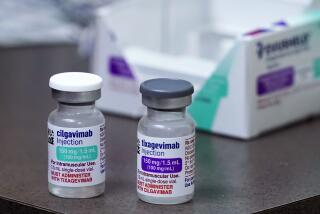FDA Panel Rejects Cold Drug Picovir
- Share via
A U.S. advisory panel on Tuesday rejected one of two treatments for the common cold that are in the development pipeline. The drug, from ViroPharma Inc., was rejected, according to the Food and Drug Administration panel, because its modest health benefits were outweighed by significant potential dangers.
The FDA usually follows the advisory panel’s advice.
That development probably means good news for Pfizer Inc.’s Global Research & Development/La Jolla Laboratories, which is testing a drug originally developed by Agouron Pharmaceuticals Inc. in La Jolla, now a Pfizer unit.
Picovir, the first drug to attack the cause of the common cold and not its symptoms, cut the illness short by about one day, according to ViroPharma’s own studies.
The drug, co-developed by Aventis Pharmaceuticals, a U.S. unit of French company Aventis, came in pill form and was to be taken within 24 hours of the start of symptoms. Treatment lasts five days.
Picovir, according to company literature, works by attacking so-called picornaviruses, the family of viruses believed responsible for more than half of all colds. The drug prevents the viruses from copying themselves and infecting healthy cells.
But the panel voted 15 to 0 to urge the FDA to decline Picovir, known generically as pleconaril, because of the danger that it could increase resistance to some viral infections in users and might result in excessive menstrual bleeding in women.
FDA staff reviewers said they also were concerned that the drug might be linked to a racing heart rhythm.
Two unplanned pregnancies that occurred during the human trials also might have been related to interactions between Picovir and contraceptive pills.
ViroPharma’s situation is difficult because of the lopsided vote and because a treatment for a simple illness needs a clean safety record during trials.
“The chances of FDA overturning the panel’s recommendations are very small,” said Dr. Sushant Kumar, an analyst with Mehta Partners in New York. “The most sensible approach would be to determine whether ongoing studies are sufficient to answer some of these concerns or whether new studies are needed.”
Kumar said that ViroPharma, particularly with the backing of Aventis, “has a good amount of cash” and the resources to keep the fight for the drug alive.
“We’ll just have to see how salvageable the program is and how long it might take,” Kumar said.
FDA rejection would leave ViroPharma without any prospective drugs in advanced development.
Shares of the company, as high as $40 in May, have been trading around $13. Trading was halted Tuesday during the panel’s deliberations.
Medical researchers have expressed hope about Picovir and Pfizer’s treatment, in part because they could reduce the need for antibiotics.
Dr. James Cherry, a specialist in pediatric infectious diseases at Mattel Childrens Hospital at UCLA, was a consultant to ViroPharma during the development of Picovir and said that he had been impressed with the drug’s ability to arrest fever and other major symptoms of viral meningitis. Cherry added that the drug appeared to be safely effective for that use.
But Cherry said, “antivirals aren’t easy. We’re not at all close to being as effective in their use as a form of treatment as penicillin, for example, in which a person feels better in just one day. Antivirals are nowhere near as clear-cut and as rapid.”
The other cold-fighting drug is Pfizer’s AG7088, a protease inhibitor similar to the drugs that revolutionized AIDS treatment.
The protease inhibitor halted the action of a key enzyme that the virus needs to replicate in at least 100 strains of the common cold, according to Pfizer.
Pfizer’s drug, a nasal spray that is inhaled several times daily, is still in the second stage of human testing, said Kim Simon, a Pfizer spokesman.







